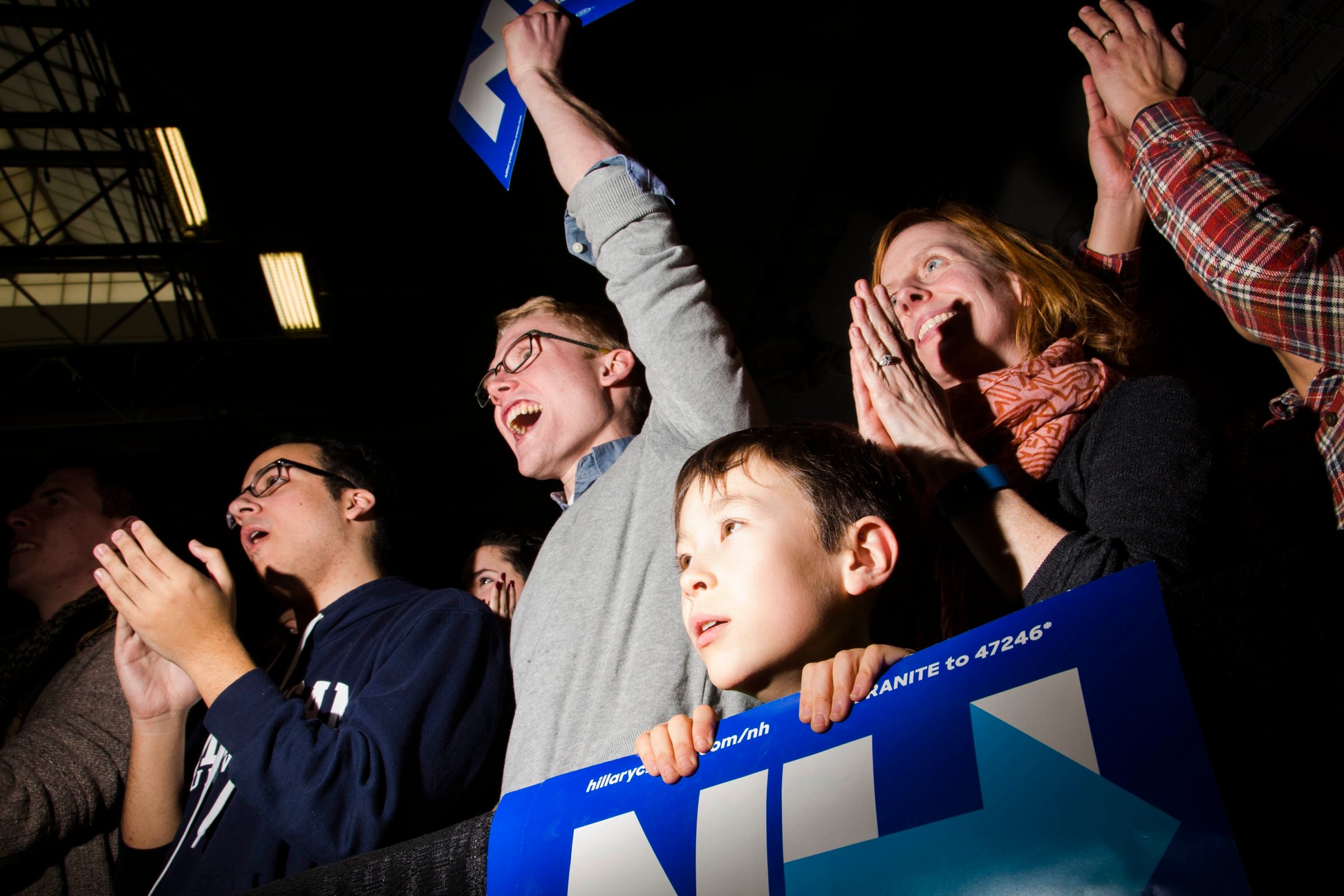
Voters in New Hampshire handed victories to Republican Donald Trump and Democrat Bernie Sanders on Tuesday, according to AP projections, as the first-in-the-nation primary state reshaped the race for the White House.
Trump, who had long been the favorite to win on the Republican side, began his victory speech by thanking his family and campaign workers before moving on to his rivals and, last of all, the voters. “New Hampshire, I want to thank you, I love you, we’re going to be back a lot, we’re not going to forget you,” he said. “You started it, I want you to remember you started it.”
The real race among Republicans was the fight for second place; won, according to AP projections, by Ohio Gov. John Kasich, who held more than 100 town halls in the state and spent more time there than any other candidate. “Clearly change is in the air,” Kasich said. “Maybe, just maybe, we are turning the page on a dark period in American politics. Tonight the light overcame the darkness.”
His strong finish, on the back of the state’s moderates and independents, will be hard to replicate in the far more conservative South Carolina, where Texas Sen. Ted Cruz and Florida Sen. Marco Rubio will be hoping for a more robust showing.
Rubio, whose better-than-expected third-place finish in Iowa led some to anoint him the chosen candidate of the establishment, acknowledged his lackluster performance in Saturday night’s debate had damaged him in the Granite State. “Our disappointment is not on you, it’s on me,” he said. “I did not do well on Saturday night. But listen to me: That will never happen again.”
Christie’s likely sixth-place finish behind his gubernatorial rivals all but dooms his campaign, something the New Jersey governor seemed to acknowledge in remarks on Tuesday night. “We’re going to go home to New Jersey tomorrow and we are going to take a deep breath,” he said. “See what the final votes are tonight, so that matters … That is going to allow us to make a decision about how we move from here in this race.”
It’s unclear where the New Hampshire results will leave former Florida Gov. Jeb Bush, who looked likely to finish in fourth place, or businesswoman Carly Fiorina who trailed the pack with projections in the single digits. Retired neurosurgeon Ben Carson, expecting a loss, already headed to South Carolina.
Watch Live: Republicans React to New Hampshire Results
On the Democratic side, Vermont Sen. Bernie Sanders had been forecast to handily defeat Hillary Clinton, but all eyes will be on the margin of victory, with the former Secretary of State’s campaign preparing to claim victory if they can narrow it to single digits. With around 50% of votes tallied, Sanders led Clinton by 20 points. Exit polls suggested the only age demographic Clinton won was seniors 65 and older.
Clinton spoke first on Tuesday night, addressing supporters after conceding victory to Sanders. “I still love New Hampshire and I always will,” she said. “Now we take this campaign to the entire country. We’re going to fight for every vote in every state.”
“People have every right to be angry, but they’re also hungry—they’re hungry for solutions. What are we going to do? And that is the fight we’re taking to the country.”
Sanders, who spoke directly after his Democratic rival, credited his victory with the “enthusiasm and excitement” of his young supporters, who helped drive turnout in New Hampshire to record levels.
“Together we have sent a message that will echo from Wall Street to Washington, from Maine to California,” he said. “And that is that the government of our great country belongs to all of the people, and not just a handful of wealthy campaign contributors and their Super PACs.”
Victory is validation of Sanders’ insurgent campaign, but he continues to trail Clinton in key states later in the calendar. Clinton’s campaign has struggled with how to handle Sanders’ candidacy, shifting between defining him as a rigid ideologue and a less-sincere hypocrite—while fighting speculation that a campaign staff shakeup would follow the New Hampshire results.
In terms of delegates to the Republican National Convention, this primary is relatively minimal, binding just 20 delegates—less than 1%—of the total. The delegates are divided proportionally among candidates that earn at least 10% of the statewide vote, with the remaining delegates going to the statewide winner. On the Democratic side, 24 delegates—an even smaller share of the larger Democratic convention—were awarded.
The next GOP debate, hosted by CBS on Saturday night in Greenville, S.C., should help winnow the field further, with only the top three finishers in Iowa, the top five finishers in New Hampshire, and the top five in national and South Carolina poll averages earning an invite. That means Christie, Kasich or Fiorina must finish in the top-five in New Hampshire to make the stage.
Democrats will travel from Manchester to Milwaukee, where the next debate will be held on Thursday night. From there they have 10 days until Nevada votes, and another week until South Carolina.
More Must-Reads From TIME
- The 100 Most Influential People of 2024
- Coco Gauff Is Playing for Herself Now
- Scenes From Pro-Palestinian Encampments Across U.S. Universities
- 6 Compliments That Land Every Time
- If You're Dating Right Now , You're Brave: Column
- The AI That Could Heal a Divided Internet
- Fallout Is a Brilliant Model for the Future of Video Game Adaptations
- Want Weekly Recs on What to Watch, Read, and More? Sign Up for Worth Your Time
Write to Alex Altman / Concord, N.H. at alex_altman@timemagazine.com